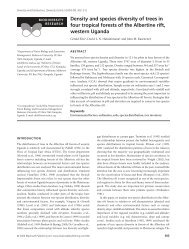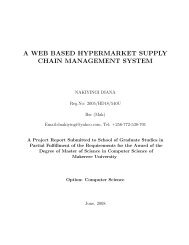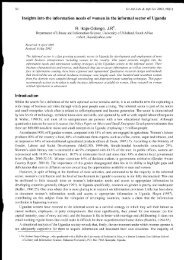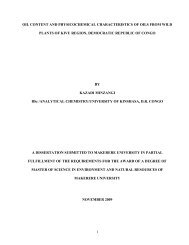THE UNIVERSITY OF LEIPZIG
THE UNIVERSITY OF LEIPZIG
THE UNIVERSITY OF LEIPZIG
Create successful ePaper yourself
Turn your PDF publications into a flip-book with our unique Google optimized e-Paper software.
Other scholars in the area of property rights like Engerman and Metzer who studied land<br />
rights, ethno-nationality and sovereign history, noted that traditionally property rights are<br />
viewed as necessary pre-conditions for the efficient operationalization of the environment<br />
market place community user. 672 This same argument is reinforced by McKean who states<br />
that there are natural resource regimes that are governed as open access regimes but no one<br />
claims recognized property rights. 673 This same postulation appears to fit well in the<br />
Kakamega scenario, where the structure of traditional authority in a great measure presides<br />
over ecological and cultural decisions among the Luhya sub-tribes. But we also have to look<br />
at the property rights regimes in Kakamega from another view especially where a<br />
formal/national resource regime management style exists but inherently met with<br />
immeasurable acrimony and missive. There are general principles which are necessary but not<br />
sufficient in them for the efficient normalisation of property rights regimes.<br />
In making an analysis of the above postulation, we observe that specific attributes of social<br />
and ecological contexts which must be represented. The social contexts, as we have noted<br />
earlier contain all the dynamic relationships between the humans and nature, but must also<br />
contain entitlements and duties that come with the entitlements in maintaining the resources<br />
of nature. For instance, as we mentioned earlier, during the study we wanted to investigate the<br />
respondents’ views on whether the current formal legalities such as the Forest Act, the<br />
Environmental Management and Coordination Act, the Local Government Act among others,<br />
favoured their social and cultural interests. 61.64% responded in the negative, arguing that<br />
they felt the current legalities didn’t favour their social and cultural interests. Only 34.29 felt<br />
otherwise. We also wanted to find out whether the respondents felt that the current forest<br />
authorities know about their social, economic and cultural interests.<br />
From the field results, 63.01% of the respondents answered that some of the authorities didn’t<br />
know about their interests, while 36.01% informed the researcher that the forest authorities<br />
knew about their local interests. The above accounts paint a picture of unmitigated resource<br />
usage interests and resource rights between the formal institutional regimes and the local<br />
institutional regimes. For example, the respondents gave instances of when the forestry<br />
authorities curtail them form collecting local herbs which they use in some of their traditional<br />
ritual ceremonies, an issue that put forest wardens and local communities at logger heads<br />
Further still, it was also found out that some of the forest authorities did not even trust the<br />
local tribal heads that worked to prevent unhealthy access by those thought to be<br />
destructionists within their localities. In one such instance a local tribal head among the Tiriki<br />
informed the researcher that they feel mistrusted by some of the forest wardens. As this key<br />
respondent informed; “they think that the local authorities connived with the destructionists<br />
672<br />
Engerman, L.S and J, Metzer. 2004. Land Rights, ethno-Nationationalism and Sovereignity History.<br />
London:Routledge.<br />
673<br />
McKean, A. M. 1992. Management of Traditional Common Lands (Iriaichi) in Japan. In Making the<br />
Commons Work: Theory, Practice, and Policy, edited by. D. W. Bromley. San Francisco: ICS Press.<br />
173






